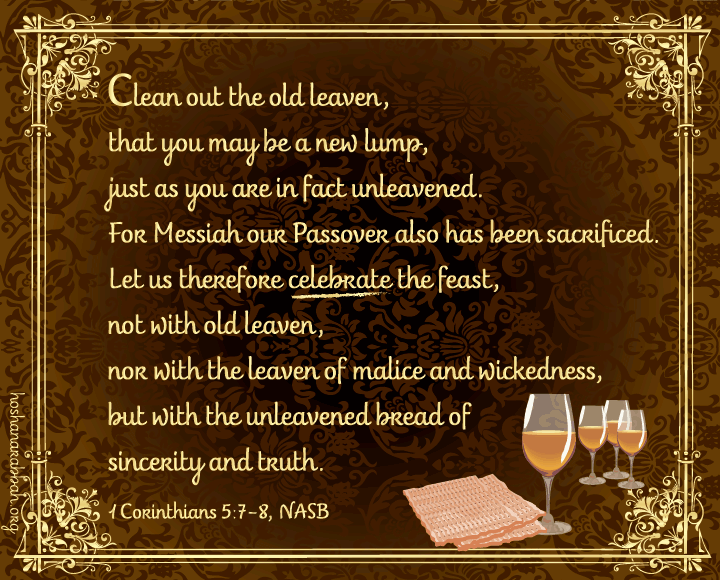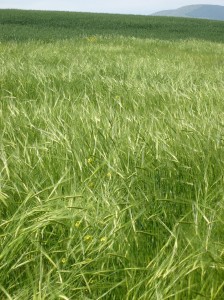
Chag HaMatzot (The Feast of Unleavened Bread): An Overview
Chag HaMatzot or the Feast of Unleavened Bread is the second annual festival on YHVH’s biblical calendar, and occurs on the fifteenth day of the month of the Abib, which is the day immediately following Passover (or Pesach, Lev 23:5–8). Because both of these feasts (Exod 34:25; Lev 23:2, 6) occur back-to-back, the Jews often refer to Passover and Unleavened Bread simply as Passover Week or some similar term that places the main emphasis on the Passover. But it must be noted that, though related, these two festivals are separate in meaning and purpose. Passover pictures Israel coming out of Egypt. Upon separating from Egypt, YHVH (the LORD) then commanded the Israelites to put all leavened food products out of their houses and to eat unleavened bread (flat bread) for seven days, hence the origins of the Feast of Unleavened Bread. Additionally, the first and seventh days of this week-long event are Sabbaths, and YHVH commanded his people to hold a set-apart convocation (or gathering) on these Sabbaths.
What, you may ask, is the purpose of putting leavening out of one’s home and eating unleavened bread products such as matzoh for one week? This seems like a curious request by YHVH of his people. Not surprisingly, the Creator of the universe has a reason for everything. The spiritual implications are enlightening and highly relevant to the disciples of Yeshua. In commanding his people to de-leaven their homes and lives, YHVH is teaching us an object lesson that applies to us as much today as to the Israelites of long ago.
Eating unleavened bread for seven days is a memorial, remembrance or reminder (Exod 13:6–9) of our coming out of our own spiritual Egypt. But how did unleavened bread enter into this picture? The Torah tells us that the Israelites left Egypt early in the morning as they were making their daily bread, and because they left in haste the bread was not able to rise (Exod 12:34). Therefore, they were forced, by circumstances, to leave their leavening — a biblical metaphor for sin — behind in Egypt. Similarly, believers in Yeshua are commanded to keep the Feast of Unleavened Bread (1 Cor 5:6–8), which helps to remind us that we should have left our old sinful ways behind us in the spiritual Egypt of this world when we surrendered our lives to Yeshua. We are pressing onward to the Promised Land of YHVH’s eternal kingdom.
Not only did YHVH command his set-apart people to leave Egypt (a biblical metaphor for this world and its godless ways), but he wanted his people to separate themselves from and leave behind in Egypt the rudiments of this world, or sin, which defiles them and separates them from a set-apart and sinless Elohim (God). Leaven is a picture of this, as we will see more clearly below.
The Feast of Unleavened Bread was the next step in YHVH’s plan of redemption for his people. Israel had just left Egypt and we know that Egypt is biblically a spiritual metaphor for the world and Satan. It may have been easy for the Israelites to leave Egypt, but after their exodus, the arduous process of getting the sin or spiritual leaven of Egypt out them began! The same is true when we leave the spiritual Egypt of this world and endeavor to follow obey Yeshua through our spiritual journey in the wilderness we call life. The old sin habits die hard and often lie hidden in our lives waiting to be exposed and cast out from the recesses of our mind, will and emotions—or one’s spiritual houses. This is not an easy process, and is not unlike ridding our physical homes of leavening products, such as bread crumbs, which find their way into the nooks and crannies of our homes that the word of Elohim commands his people to do in order to properly keep the Feast of Unleavened Bread (Exod 12:14–15). Throughout Scripture, leavening usually represents sin, pride, hypocrisy, malice, bitterness and false religious doctrine (Pss 71:4; 73:21; Hos 7:4; Matt 16:6; Mark 8:15; Luke 12:1; 1 Cor 5:8–6; Gal 5:9).
The Feast of Unleavened Bread lasts seven days. The number seven in YHVH’s spiritual economy represents completion or perfection. YHVH has given man 7000 years on this earth to get rid of sin completely and totally in preparation for admission into his eternal kingdom as revealed in Revelation 21 and 22. For 6000 years, YHVH has left men on this earth to their own sinful devices. The seventh thousand-year time period, called the Messianic Age or Millennium (Rev 20:2, 3, 4, 6), will be different than the previous 6000 years, for during this time Yeshua will be ruling over the earth with a rod of iron as King of kings and Lord of lords (Rev 2:27; 12:5; 19:15; 17:14; 19:16), and Satan will be bound in the pit (Rev 20:2–3). All humans on earth will be taught the Torah-truth of YHVH Elohim without the evil influences of the devil and the world as we know it today. During the Messianic Age, the earth will be at peace and rest, and men will be taught to love YHVH with all their heart, mind and strength and to love their neighbor as themselves. This time of relative peace and rest is the seventh thousand-year time period of man’s tenure on this earth, which corresponds to the seventh day of the week—the Sabbath. It will be a Sabbath of rest and peace on this earth for 1000 years. The Days of Unleavened Bread picture this, for the first day is a Sabbath representing the first Sabbath when YHVH rested after creating a perfect, paradisiacal and sin-free world. The last day or seventh day of the Feast of Unleavened Bread is also a Sabbath, which corresponds prophetically to the Messianic Age.
Continue reading

